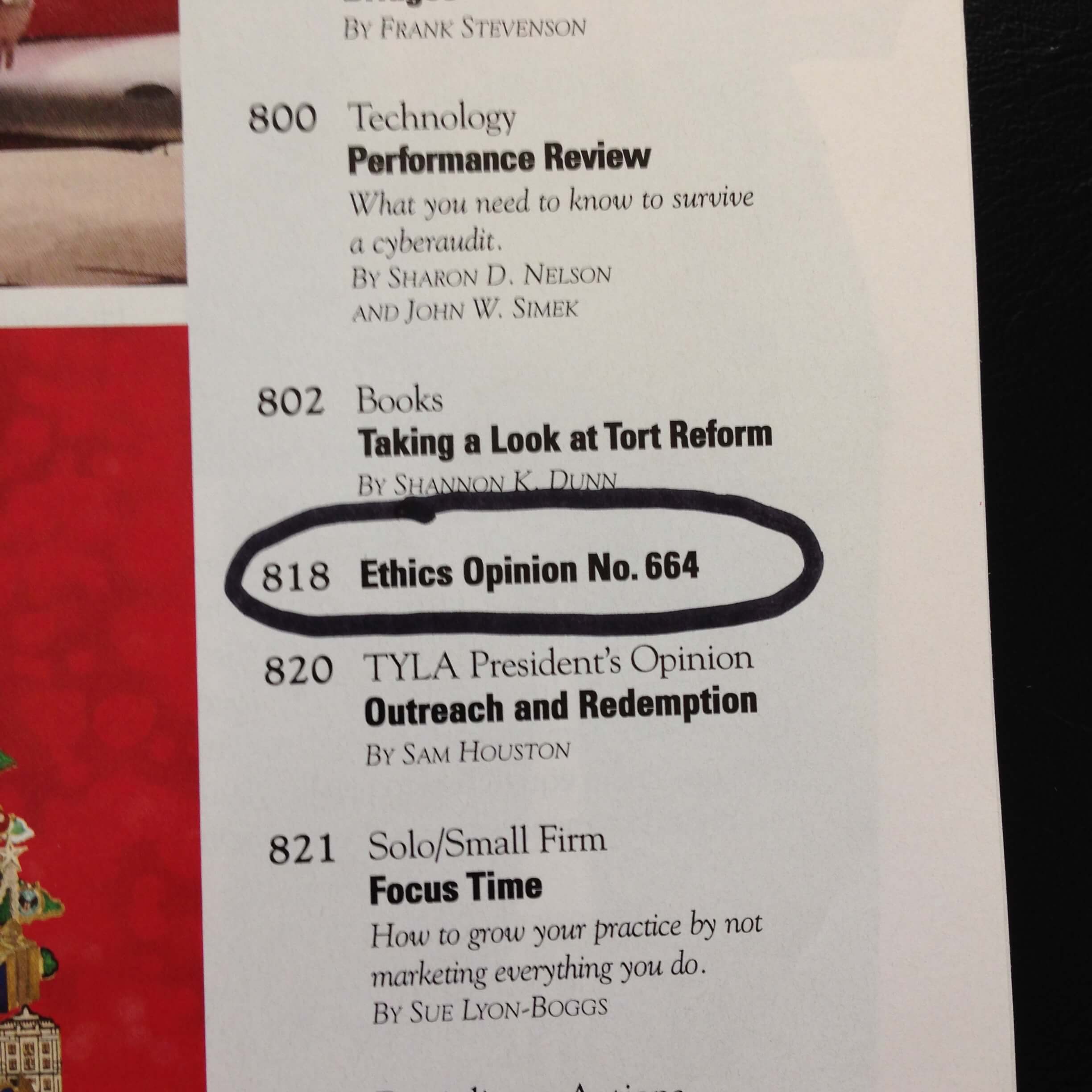A typical customer list scenario illustrates the problem
On the first day of law school, they teach us that the answer to almost every legal question is “it depends.” (And I hear they teach the same lesson on the first day of Economist School.)
Opinion 664 from the Texas Center for Legal Ethics takes 1,699 words to say the same thing. The issue: a lawyer’s ethical duty to disclose that he has the opposing party’s confidential or privileged information.
We’re talking lawyer ethics, so you know there’s going to be a hypothetical, right? Well here it is.
Paula Payne Windows sells windows, primarily for residential construction. Dawn Davis, one of Paula Payne’s top sales people, leaves Paula Payne and takes a job with Real Cheap Windows. Paula Payne sues Dawn Davis and Real Cheap for misappropriating confidential information and trade secrets. Specifically, Paula claims that Dawn took a confidential customer list she compiled while working for Paula—specifically, the names and contact information for her customers stored on her iPhone contacts.
Dawn hires you to represent her in the lawsuit. She tells you she does indeed have the names and contact information for her 50-some-odd customers on her iPhone.
Shortly after you file an answer, opposing counsel inadvertently copies you on a confidential email to his client in which he says, “I know it’s silly, but we need to claim that Dawn’s customer list is a trade secret.” The email attaches a memo outlining opposing counsel’s legal strategy.
Two questions: (1) do you have an ethical duty to disclose to opposing counsel that Dawn has the customer list? (2) do you have an ethical duty to disclose to opposing counsel that you received the confidential email?
A recent Texas ethics opinion weighs in on two issues
These are the issues addressed by Texas Ethics Opinion 664. The answer? “Not necessarily.” Which is another way of saying, “it depends.” The opinion is careful to distinguish between what a lawyer should do and what the Texas Disciplinary Rules of Professional Conduct require. A lawyer should aspire to inform opposing counsel of an inadvertent disclosure of confidential information, the opinion says, but failing to do so is not necessarily an ethical violation.

In the words of the Opinion: “a Texas lawyer who fails to provide notice to opposing counsel upon receipt of an opposing party’s confidential information outside the normal course of discovery does not necessarily or automatically violate the Texas Disciplinary Rules.
The answer is the same whether the information is obtained in an unauthorized manner or inadvertently.”
But the Opinion also notes that the use of the confidential information could violate the ethics rules depending on the circumstances, citing rules that bar lawyers from engaging in or assisting criminal, fraudulent, or dishonest conduct. The “not necessarily” answer strikes me as basically correct, but not very helpful. To use a technical legal term, Ethics Opinion 664 is too wishy-washy.
A duty to disclose the other guy’s inadvertent disclosure of privileged information would make more sense
The root of the problem is that the opinion tries to address two significantly different questions at once. The opinion underappreciates the difference between the questions, particularly the difference between privileged information and confidential information. Instead of giving a wishy-washy answer that tries to cover both issues, the opinion could have given separate, more definitive answers.
I’ll use my hypothetical to explain what I mean. As Dawn Davis’s lawyer, would you have an ethical duty to disclose to opposing counsel that he inadvertently sent you a privileged memo outlining his legal strategy?
I bet when you first read this question you said yes. That seems like the right answer to me as well.
And I’m not the only one. ABA Model Rule 4.4(b) says: “A lawyer who receives a document or electronically stored information relating to the representation of the lawyer’s client and knows or reasonably should know that the document or electronically stored information was inadvertently sent shall promptly notify the sender.”
This seems like a workable common sense rule. Like most good manners, it’s reciprocal: if you tell me when I send you something privileged by mistake, I’ll do the same for you. One reason this rule would make sense is that in most cases it is obvious when opposing counsel has inadvertently sent you privileged material. The lawyer who receives the communication usually doesn’t have to make a difficult judgment call about whether it’s privileged or not.
A duty to disclose that your client has confidential information would make less sense
The second issue from the hypothetical is quite different. Do you have an ethical duty to disclose that your client Dawn Davis took Paula Payne Window’s confidential customer list?
I bet when you read this question you said no, and I agree. But why?
First, it’s important that the confidential status of the customer list is an issue in dispute in the lawsuit. Keep in mind that a customer list can be—but is not necessarily—a trade secret (more about this issue here).
If you represent Davis, you’re going to take the position that Davis’s list of her own customers is not a trade secret or even confidential information. Now imagine that the ethics rules required you to volunteer that your client possesses that information if the information is actually confidential. Your ethical obligation would depend on a judgment call on an issue in dispute in the litigation. This would be unworkable.

Ethics Opinion 664 fails to address this problem. It simply assumes that the information is confidential.
But the problem goes beyond that. Even if we assume that the information held by the client is confidential information or a trade secret, it would be strange for trade secret cases to be subject to a special rule that a lawyer has an ethical duty to volunteer information to the other side about an issue in dispute in the litigation.
Keep in mind we’re talking about an ethical obligation to volunteer information, not the duty to respond to proper discovery requests. If the Court orders Dawn Davis to produce documents that contain customer names and information, then her lawyer’s obligation is clear. But that is not the question presented.
If I ran the zoo
It’s hard to find anything incorrect in Ethics Opinion 664. But the opinion could have provided better guidance. Rather than giving one generic answer to two different questions, the opinion could have drawn a sharper distinction between the questions and taken a stronger stand on each.
Generally, there should be an ethical duty to disclose to opposing counsel that he has inadvertently sent you privileged information. Generally, a lawyer should not have an ethical duty to disclose that his client has documents that the opposing party claims contain confidential information or trade secrets.
But why do I say “generally”? Well, you know. Because it depends. ________________________

These are his opinions, not the opinions of his firm or clients, so don’t cite part of this post against him in an actual case. Every case is different, so don’t rely on this post as legal advice for your case.




Comments:
Hi there
You want quality traffic that Buys From Your Site fiveminutelaw.com or Converts into Highly Responsive Subscribers ?
I Will Promote Your Business In Worldwide To Any Niche …
– I search in google after the keyward offered by you in order to find sites;
– I will ask the site administrator if he is interested in your offer;
– The process continues on many sites until you get all the vizits promises.
I can send your offer on:
– Country Desired (only the country you specify)
– 80% TIER 1 Countries Guaranteed (USA, CA, GB, AU, NZ, IE)
– Niche Desired(only the keywords you specify)
We help you grow your business because we understand that our business growth directly depends on our ability to GROW YOUR BUSINESS.
Please follow here for more information:
https://bit.ly/Get_Traffic_That_Converts
Regards,
AxyyKo